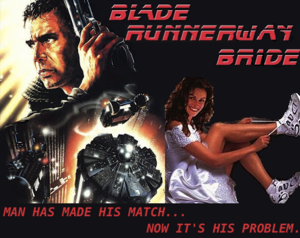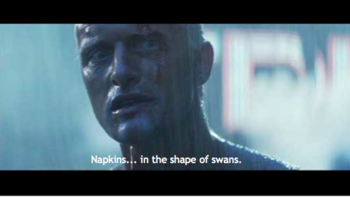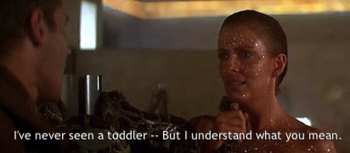BladeRunnerway Bride
| BladeRunnerway Bride | |
|---|---|
 The movie's original poster. | |
| Starring | Harrison Ford Rutger Hauer Richard Gere Julia Roberts |
| Distributed by | Paramount Pictures |
Release date | 1999 |
BladeRunnerway Bride is a 1999 American dystopian science fiction romantic comedy directed by Ridley Scott and starring Harrison Ford, Rutger Hauer, Richard Gere and Julia Roberts.
The screenplay, written by the team behind Four Weddings and a Funeral, is loosely based on the novel Do Androids Dream of Electric Shags? by Philip K. Dick.
Cast
Plot
The film depicts a dystopian Los Angeles in November 2019 in which Maggie Carpenter (Roberts) is a spirited and attractive young woman who has left a series of fiancés in almost identical fashion, earning her the nickname "The Replicant".
Rick Deckard (Ford) is a burnt-out expert "Bride Hunter" who reluctantly agrees to take on one more assignment: to track down and kill Maggie. Deckard finds himself falling in love with Maggie, but he has competition from two unlikely sources.
Reporter Graham "Ike" Eisenhower (Richard Gere) is also 'hunting' Maggie - for an interview! - and eventually the two find themselves becoming more and more attracted to each other. While Maggie is in the middle of rehearsing her latest wedding, to an android named Roy Batty (Hauer), Ike is asked to help her rehearse walking down the aisle. When Ike and Maggie "practice" the kiss right in front of Batty, they admit their true feelings for one another.
As a result, Batty shoots Ike with his stun beams, and flies out through the roof of the church, propelled partly by his anger and partly by the rocket launchers inside his legs.
Soon after, since a wedding is already set to take place, Ike and Maggie agree to get married. But on the day of the wedding Maggie gets cold feet, and leaves Ike, too, standing at the altar.
As she rides away on a flying FedEx truck, her face a mixture of regret and relief, Deckard enters the vehicle, having secretly clung to the roof of the truck. He accuses Maggie of not being human, and when she attempts to prove her humanity by showing him her a photograph of her family, Deckard tells her that her apparently natural charms are merely implants. She bursts into tears, drops the photograph and leaps off the truck to the sidewalk hundreds of meters below, executing a perfect vertical landing despite her heels.
Later that evening Deckard is searching for Maggie in a crowd when he is spotted by Leon, the spurned lover of Zhora, the last runaway bride he 'retired'. Leon attacks Deckard but Maggie intervenes, killing Leon with Deckard's gun. The two return to Deckard's apartment, where he promises not to hunt her and they manage to make love, despite Maggie's initial reluctance to connect to his spotty wifi.
The story jumps forward several years, when Maggie shows up unexpectedly at Ike's apartment one night. She explains that she has left Deckard at the altar because she is a robot and his father made an offensive comment about mixed marriages. She then vows never to "replicate" her behavior at her next wedding, and symbolically hands over her running shoes to Ike, and proposing.
At that very moment, Deckard arrives at the apartment and shoots Ike dead, but before he can declare his love for Maggie, he is in turn ambushed by Batty.
Deckard flees to the top of the building, but slips and is left hanging from a rooftop. Just as he is about to fall, Batty saves him. It becomes apparent that Batty's batteries are running out, and in his dying moments, he delivers a monologue on how his memories of his dream wedding are about to disappear:
“I’ve seen things you people wouldn’t believe. Napkins in the shape of swans... I watched sea-breams glitter on the banquet table next to a five-tier wedding cake. All those moments will be lost in time like... tears in rain.”
– Batty's final monologue
Deckard returns to Maggie's apartment and the two reconcile and kiss after he restores a two-day old version of her hard drive.
Deckard's partner Gaff arrives and shouts to him: "It's too bad she won't live, but then again, who does?" which is interpreted either as implying that Deckard too is a robot, or that no one who is married can ever be said to "live".
Production
Harrison Ford, looking for a character with dramatic depth, took on the role of Deckard, but the experience was not a happy one. Movie execs put pressure on director Ridley Scott to move the film away from its originally typical sci-fi script towards one with more romantic comedy leanings, and specifically a main role for Roberts.
Apart from friction with the director, Ford also disliked the voiceovers he had to do to bookend each act, all of which were sung to the sound of Doe, a Deer, a Female Deer from The Sound of Music: "When we started shooting it had been tacitly agreed that the version of the film we'd agreed upon was the version without voiceover narration. It was a fucking nightmare. I thought that the film had worked without the narration. But now I was stuck re-creating that narration. I went kicking and screaming to the studio to record it."
Roberts and Gere's arrival was by far the most disruptive issue. The pair had been looking for a movie to work on together since 1990's Pretty Woman broke all box office records for a whore flick. Hollywood's shock at their choice of film this time was reflected by that of the existing cast and crew. The two stars were met frostily, and were the subject of a number of practical jokes involving horse-faces and hamsters. Roberts' constant smile was said to have reduced from its trademark 120 watts to a mere 80. Finally, as Ford reflected, "They both won us around. The more you look at Julia, the less horse you see, and the more nice, all-American sweetheart you want to live for. And Richard is not as big as a prick as people make out. I think he's probably not gay and not even into hamsters."
One role that was not difficult to cast was Rutger Hauer as Roy Batty. Scott once famously described Hauer to Joan Rivers, who'd asked him if Hauer was important to the movie. "Whey aye man, he were a reet canny Batty, man, woman, man. [1] Aye, there were summik Aryan about him like. He had biceps the size of bird's baps, an' aaaaall."
The Dutchman proved his worth by improvising the film's most famous monologue, reproduced above. Hauer reflected on the speech in an interview in 2006: "I simply thought about all the weddings I had been to, all the decorative touches I had seen the gay designers make, and how much I would want to marry Julia Roberts if I was a robot. It just came to me."
Cultural influence
The film has had a huge impact on the way Hollywood makes romantic comedies, with Jennifer Aniston noting, "All of us in the rom-com game [...] we're basically trying to emulate BladeRunnerway Bride."
One of the movie's most iconic scenes, in which Deckard tests Zhora to see if she is really a runaway bride, has been the subject of many parodies. He admininisters a Voight-Kampff exam, named after the maiden name of infamous runaway bride Angelina Jolie.
In the scene, Deckard straps Zhora feet to bicycle pedals and asks her various questions to test if she has a built-in instinct to run when symbols of commitment are mentioned.
DECKARD sits back in his chair speaking mechanically from a script.
DECKARD glares at ZHORA.
DECKARD, visibly exasperated by the latest question, answers dismissively.
DECKARD looks up. A brief, tense, pause.
The hum of the room can be heard as the camera stays on ZHORA for a few wordless seconds.
DECKARD leans in, intensely, gaining momentum, predatory.
ZHORA sits up, rigidly.
DECKARD stares at her with searching eyes.
ZHORA begins peddling furiously.
Reception
The gross for the opening weekend was a disappointing $6.15 million on a $28 million budget. A significant factor in the film's rather poor box office performance was that it was released at the same time as Shakespeare in Love, a rather more conventional romantic comedy with no robots.
Critical reaction was mixed. Sheila Benson from the Los Angeles Times said it was "a bizarre piece of shit which made no sense" but went on to praise the "star quality" of Ford, Roberts, and Gere. Pat Berman in The State and Columbia Record described it as "so-so sci-fi bot-rom-com mish-mash". Roger Ebert was more positive, describing the movie as "moody and cinematic in its depiction of a horrific future, with just the right amount of laughs and romance."
Jonathan Ross on the BBC's flagship movie review programme said, "On paper it looked like the studios had got together and fed two scripts into the same fax machine. But you can't help rooting for Julia to get it on with Hauer. And Ford. And Gere. And even Ridley. Deep down I want Julia Roberts to be a nasty, kinky bitch robot too."






